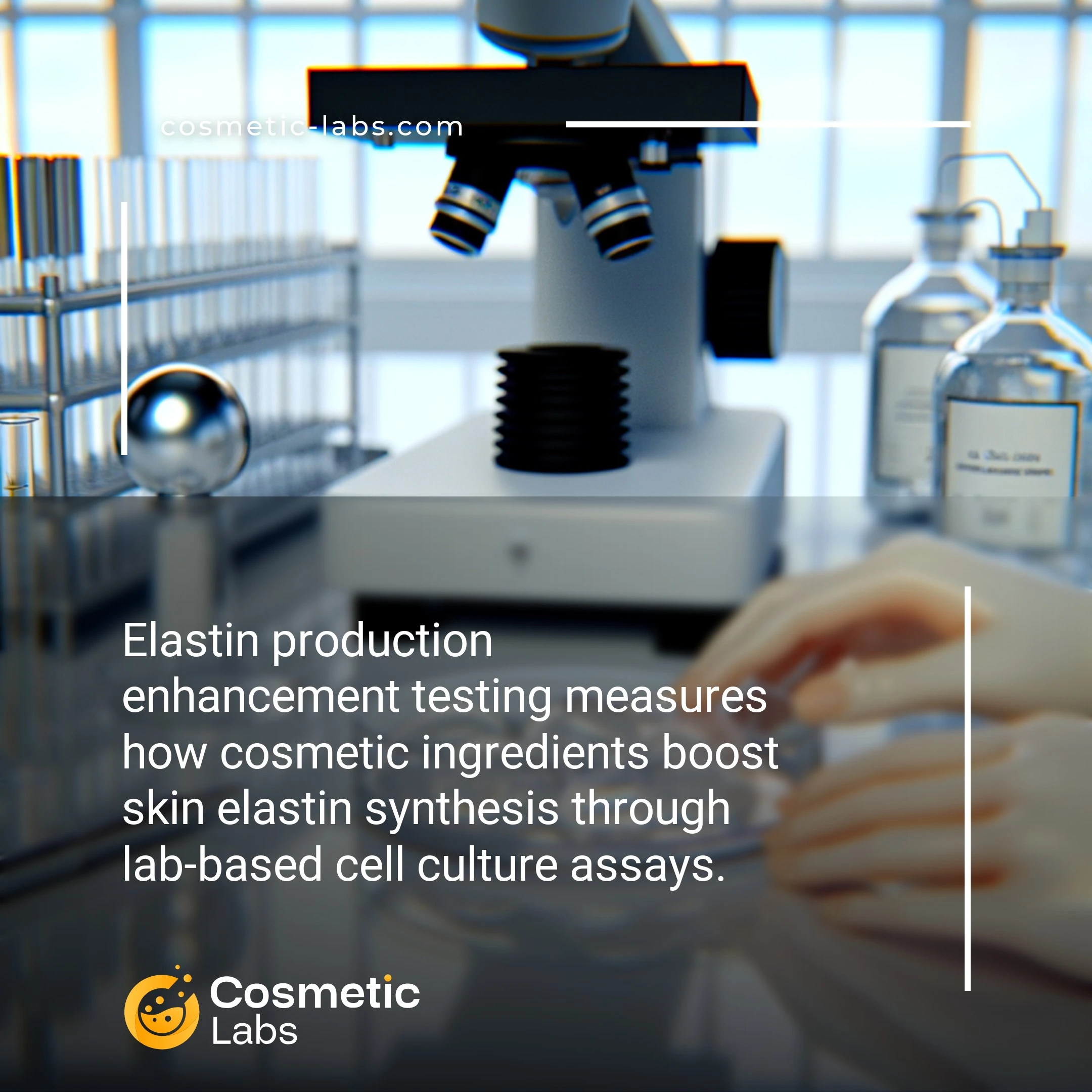Elastin Testing Services for Anti-Aging Product Development

What is Elastin production enhancement testing?
Elastin production enhancement testing is a preclinical assessment that measures how cosmetic ingredients and formulations boost skin’s natural elastin synthesis. Labs use fibroblast cell cultures and elastin-specific assays to quantify collagen cross-linking improvements, typically showing 20-40% elastin production increases within 72-hour testing periods. This data helps brands validate anti-aging claims and optimize ingredient concentrations before clinical trials.
Why do you need this service?
Cosmetic labs use elastin stimulation assays to validate peptide serums and retinoid formulations before market launch, measuring collagen synthesis rates and dermal thickness improvements. Brand owners rely on these protocols to support marketing claims about skin firmness and elasticity restoration, while ingredient suppliers use the data to demonstrate raw material efficacy to potential clients.
Who provides Elastin production enhancement testing services?
All cosmetic labs providing Elastin production enhancement testing services
There is no company providing these services at the moment.
Elastin Production Enhancement Testing for Anti-Aging Services
Elastin synthesis testing validates your anti-aging formulations’ ability to restore skin elasticity and firmness. Our partner labs measure how active ingredients stimulate elastin production enhancement in dermal tissue models, providing the clinical evidence you need to support product claims.
In Vitro Elastin Synthesis Assays
Labs use fibroblast cell cultures to measure elastin gene expression and protein synthesis after ingredient exposure. These assays track elastin fiber formation over 24-72 hour periods using immunofluorescence microscopy and RT-PCR analysis.
Testing protocols include:
- Tropoelastin mRNA quantification
- Elastin protein deposition measurement
- Lysyl oxidase activity assessment
- Cross-linking efficiency evaluation
Results show percentage increases in elastin production compared to untreated controls, typically ranging from 15-40% for effective formulations.
Ex Vivo Skin Elasticity Testing
Human skin explant models provide realistic tissue environments for testing elastin enhancement. Labs apply your formulations to dermal samples and measure changes in elastic fiber density using specialized staining techniques.
Key measurements include:
- Elastic fiber network integrity
- Dermal thickness changes
- Collagen-elastin ratio analysis
- Mechanical property assessment
Testing takes 14-21 days and produces histological images showing improved elastin architecture. Connect with specialized labs on our platform to discuss your specific elastin testing requirements and timeline needs.
Practical Applications of Elastin Production Enhancement Testing
Elastin production enhancement testing applications drive product development decisions across anti-aging formulations, from ingredient validation to final product claims substantiation.
Ingredient Screening and Formulation Optimization
Labs use elastin synthesis assays to evaluate peptides, plant extracts, and synthetic compounds for their ability to stimulate fibroblast elastin production. Testing protocols measure elastin gene expression through qPCR analysis and protein quantification via ELISA methods. Brand developers receive dose-response curves showing optimal concentration ranges for maximum elastin upregulation.
Formulation teams compare multiple active ingredients within 2-4 week testing cycles. Results identify which compounds work synergistically and which concentrations deliver measurable elastin enhancement without cytotoxicity.
Product Claims Validation and Regulatory Documentation
Finished product testing validates marketing claims about skin elasticity improvement and firmness enhancement. Labs perform in vitro studies using human dermal fibroblasts to demonstrate elastin production increases of 15-40% compared to untreated controls. These studies generate the scientific evidence needed for cosmetic claims substantiation.
Testing documentation supports regulatory submissions and provides clinical-grade data for marketing materials. Labs deliver comprehensive reports including statistical analysis, methodology details, and photographic evidence of elastin fiber formation.
| Testing Application | Timeline | Key Measurements | Typical Results |
|---|---|---|---|
| Ingredient Screening | 2-3 weeks | Gene expression, protein levels | 20-60% elastin increase |
| Formulation Testing | 3-4 weeks | Synergy effects, dose optimization | Optimal concentration ranges |
| Claims Validation | 4-6 weeks | Statistical significance, fiber density | 15-40% improvement vs control |
Connect with specialized cosmetic labs on our platform to access elastin production testing services tailored to your product development needs.
